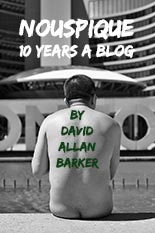
June 24th, 2014 marked the 10th anniversary of the nouspique.com blog. To celebrate, we compiled/curated/corrected/enhanced some of the best posts. In the process, we discovered a thematic coherence in the posts that had never been apparent while writing them. Although the posts touch on seemingly diverse concerns—metaphor, masturbation, poetry, the importance of shit, getting a vasectomy, copyright law, etc.—they boil down to a single concern: the intersection of words and power.
Download options:
From this site in epub or mobi formats.
Read A Sample:
About
This is a “best-of” compilation of posts to mark the 10th anniversary of the blog, nouspique.com (with spit for extra shine and boot black in the hair to make it look presentable). The “About” page that you see on most blogs seems like a good way to start a bloggish book. So what is nouspique about?
I guess you could say, at least in 2004, that nouspique was about figuring out what blogging is all about. I followed the learn-by-doing approach. If I was going to understand this emerging medium, then I would have to roll up my sleeves and get my hands dirty. For my springboard, I used what I was doing at that time. Like many other students who were blogging, I wrote about things I was studying. Since I was studying theology, I wrote about theological concerns. There were two problems with that. One: my writing sounded vaguely academic and no one, not even me, wants to read vaguely academic writing in their spare time. Two: it was theology and, to be blunt, nobody, not even me, cares about theology.
Reverting to a previous interest (once upon a time, I practiced law), I had a brief flirtation with copyright law and its intersection with cultural (mainly literary) concerns. However, there are good bloggers (e.g. Lawrence Lessig, Michael Geist & some of their detractors) who have sewn up that niche. So I reverted to a previous previous interest.
Noting that my interest in copyright wasn’t driven so much by an interest in law as by an interest in literature, I found myself writing book reviews, thinking about literary theory, and writing fiction, poetry & essays.
This is when I began to notice a pattern, the thing I can point to when people ask: what is nouspique about? The short answer is this: nouspique is about the power of words. This is my obsession. Although not always obvious, it lurks beneath everything I write. I want to know how words mean. How do they persuade and influence? How do they bring people together and raise them up? How do they corrupt people and tear them down? It’s a continuing and, maybe, lifelong investigation.
My concern for the power of words draws a thread through the disciplines I’ve tinkered with at nouspique. At first, they seem disparate and unrelated. Nevertheless theology, law & literature are all sites of contested meaning where power is at play both in the reading of texts and the way those readings are deployed to affect people in their everyday lives. If we don’t take the time to examine how this happens, then people generally (and people without power most especially) become vulnerable in ways they don’t even perceive.
Nouspique, then, is an itch on the skin of power, admittedly a minor itch, but useful.
Nouspique aspires to be what citizenship looks like. This last statement comes with a caveat. I write from a Canadian perspective (whatever that means) and, more particularly, as someone who lives in Toronto. In a world that lays claims to a globalized economics and culture, one often gets the impression that the only economics that count are the economics of Wall Street and the only culture that counts is the culture of Los Angeles. There is a place for global perspectives, but not at the expense of the local. That is why, occasionally, I celebrate the particularity of my locale. I don’t mean to suggest that my experience is somehow better than yours. Instead, I encourage you to follow my example by claiming the legitimacy of your lived experience in all its particularity.
Housekeeping: Blogs typically appear to the reader in reverse order; the most recent post is the first thing a reader sees. Books typically appear to the reader the other way around, presenting themselves in a historical mode with a beginning and an end. And some books, including this one, throw up their hands at the prospect of a neat temporal linearity and opt, instead, for a themed arrangement. As a result, some of the pieces appearing in this book reference pieces that follow them. I assume that, as intelligent readers, you’ll have no problem synthesizing the non-linear quirks that crop up from time to time.
Copyright: All the pieces in this book were originally published pursuant to a Creative Commons Non-commercial Share-alike Attribution license. However, many epublishers don’t allow for this option. The problem is that once you’ve assigned something to the Creative Commons, you can’t undo it. So, while this ebook claims that I assert my copyright in these writings, as a practical matter, readers are free to reprint them without seeking my permission so long as it’s for non-commercial purposes and their authorship is appropriately attributed.
David Allan Barker
Toronto, 2014